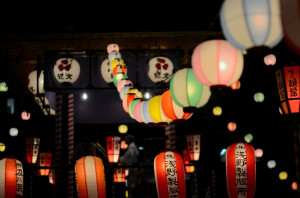
Arising from Buddhist traditional lore as interpreted in Japan, the Obon (or simply “Bon”) Festival is now widely celebrated in Japan and in Japanese communities around the world. The roots of the history entwine to make the three-day long celebration something like an amalgam of Memorial Day and the county fair in American traditions.
History
Celebrated for more than 500 years in Japan, the precise date and details of the events depend largely on the region and town for local particulars. Three potential starting dates arose from the change from the lunar calendar to the Gregorian calendar. Some, such as the celebration in Tokyo, follow the solar calendar, which sets the date at July 15. The lunar calendar date of August 15 is traditional throughout much of the country. The old-style observance is marked on the 15th day of the lunar calendar, and so it varies yearly.
Tradition
Traditional Japanese customs involve visiting and caring for graves of ancestors as well as cleaning and preparing the home for visits by spirits of ancestors. Somewhat like Memorial Day in the U.S., the time of Obon is marked with memories and celebration of the lives of those people who are very recently departed and those to whom one was especially close.
Legend
The roots of Obon grow from a story of the Buddha, when he offered guidance to a monk who had become concerned that his deceased mother was suffering torments in spirit. Buddha listened to the concerns of the young monk and then gave him a task: serve the group of monks who were completing their time of ritual fasting and suffering. The monk did as he was directed. As he was serving and feeding the other monks, he thought often of his dear departed mother and the service and joy that she had given to her family.
At the end of the time of completing the task he had been given, he reported back to Buddha that his burden was lifted: he had seen a vision of his mother, freed from her suffering in spirit and released into joy. He danced and celebrated the happy result.
Bon Odori
Bon Odori is the style of dance for which the festival has become known. This and many other parts of the celebration of Obon recall the story of the Buddhist monk who renewed his connection with his departed mother. She was gone in body but remained with him in spirit, in his actions and thoughts of her.
Worldwide Celebration
From its roots in Japan some five centuries ago to modern festivities around the globe, the joyful spirit of Obon has caught on nearly everywhere that people from Japan reside. Brazil hosts the most populous Japanese community beyond Japan. Sao Paulo is the home to the majority of Brazil’s Japanese community and sees a glorious Obon Festival every summer.
While the origins of the ceremony come from rituals of respect and homage to deceased ancestors, much of the remainder of the festival is a celebration of life. Like a summer fair, there are all manner of outdoor activities, including:
- Unique dancing, often acting out labors like farming or mining set to music
- Japanese drumming called Taiko
- Feasting on special foods for the occasion
- Community socializing
Community
Every individual is made up of contributions from the family and community. From the parents who give a start in life to each individual to siblings to more distant relatives and community members, every person receives benefit and blessings from other people. Remembering those who have passed on is an important part of honoring the memories of the good that each person has received from others in the world. The Obon Festival is a time of summer celebration, with dancing, drumming, feasting and joy, with deep roots in the importance of remembering those who have gone on before.

